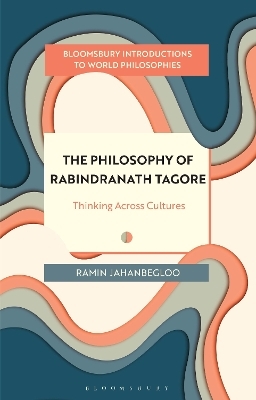
The Philosophy of Rabindranath Tagore
Thinking Across Cultures
Seiten
2025
Bloomsbury Academic (Verlag)
978-1-350-44612-0 (ISBN)
Bloomsbury Academic (Verlag)
978-1-350-44612-0 (ISBN)
- Noch nicht erschienen (ca. Januar 2025)
- Versandkostenfrei
- Auch auf Rechnung
- Artikel merken
Where does the great Bengali poet and philosopher Rabindranath Tagore stand in today’s global world?
The legacy of Rabindranath Tagore is vast. No writer in the history of India and Asia in general matches his variety and range of creation. In this book, Ramin Jahanbegloo looks beyond the poetry and literature for which Tagore was awarded the Nobel Prize, showing how his thinking enriches every branch of the humanities – philosophy, pedagogy and the arts.
Each chapter is dedicated to one aspect of Tagore’s philosophy: his vision of human nature and its relation to Nature and God; his views on interculturality and dialogue among cultures; the idea of universal education and its influence on modern educative institutions. Reading Tagore as an intercultural thinker, Jahanbegloo seeks to understand how he confronted violent and fanatic orders. He places an emphasis on Tagore’s social and political contributions, his dialogue with Gandhi and his approach to colonialism.
Attempting to bring civilisations and cultures closer together, Tagore answered many of the intellectual, moral and spiritual crises of his time. His work has inspired writers and intellectuals from different parts of the world for more than a century. This far-reaching exploration of the many facets of Tagore’s multi-dimensional thoughts allows us to understand why.
The legacy of Rabindranath Tagore is vast. No writer in the history of India and Asia in general matches his variety and range of creation. In this book, Ramin Jahanbegloo looks beyond the poetry and literature for which Tagore was awarded the Nobel Prize, showing how his thinking enriches every branch of the humanities – philosophy, pedagogy and the arts.
Each chapter is dedicated to one aspect of Tagore’s philosophy: his vision of human nature and its relation to Nature and God; his views on interculturality and dialogue among cultures; the idea of universal education and its influence on modern educative institutions. Reading Tagore as an intercultural thinker, Jahanbegloo seeks to understand how he confronted violent and fanatic orders. He places an emphasis on Tagore’s social and political contributions, his dialogue with Gandhi and his approach to colonialism.
Attempting to bring civilisations and cultures closer together, Tagore answered many of the intellectual, moral and spiritual crises of his time. His work has inspired writers and intellectuals from different parts of the world for more than a century. This far-reaching exploration of the many facets of Tagore’s multi-dimensional thoughts allows us to understand why.
Ramin Jahanbegloo is the Executive Director of the Mahatma Gandhi Centre for Nonviolence and Peace Studies and the Vice-Dean of the School of Law at Jindal Global University- Delhi-India.
Introduction: Tagore, Our Contemporary
1. Man, God and Nature in Tagore’s Philosophy
2. Tagore and Dialogue of Cultures
3. Tagore’s Educational Ideas
4. The Crisis in Civilization and Nationalism
5. Tagore and Gandhi: Lessons in Nonviolence
Conclusion: The Relevance of Tagore
Bibliograhy
Index
| Erscheint lt. Verlag | 23.1.2025 |
|---|---|
| Reihe/Serie | Bloomsbury Introductions to World Philosophies |
| Verlagsort | London |
| Sprache | englisch |
| Maße | 138 x 216 mm |
| Themenwelt | Literatur ► Lyrik / Dramatik ► Lyrik / Gedichte |
| Geisteswissenschaften ► Philosophie ► Östliche Philosophie | |
| ISBN-10 | 1-350-44612-2 / 1350446122 |
| ISBN-13 | 978-1-350-44612-0 / 9781350446120 |
| Zustand | Neuware |
| Informationen gemäß Produktsicherheitsverordnung (GPSR) | |
| Haben Sie eine Frage zum Produkt? |
Mehr entdecken
aus dem Bereich
aus dem Bereich
Deutsche Gedichte aus zwölf Jahrhunderten
Buch | Hardcover (2023)
C.H.Beck (Verlag)
CHF 41,90
Eine Liebeserklärung an die Gebrauchslyrik
Buch | Hardcover (2024)
Piper (Verlag)
CHF 22,40


